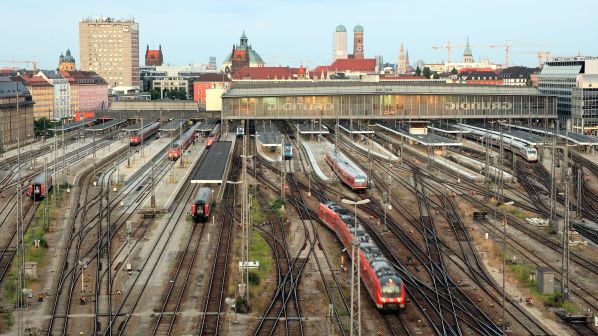GERMANY’S Monopolies Commission has warned that the €7.5bn equity increases provided to German Rail (DB) in 2019 and 2020 may lead to distortions of competition in the railway sector. The commission says this could have been better used to instead subsidise track-access charges for all operators.
The biennial report, the commission’s eighth on the rail industry, says that while competition has improved in the freight and regional transport markets, DB continues to hold a strong monopoly over long-distance services with a market share of more than 96%.
The commission says the federal government’s decision to provide the €7.5bn equity increase over two years for DB for infrastructure development and to cover losses during the Covid-19 pandemic is understandable, but risks distorting competition as the lack of vertical separation within the group meant there is no guarantee the funding will not be used to subsidise DB’s commercial operators. The commission instead called for track access charges to be subsidised and the temporary reimbursement of lost revenue for all operators.
The commission again called for infrastructure management to be legally separated from the wider DB group. If there is no political will to do this, the commission says the organisational independence and economic transparency of DB Networks should at least be strengthened. The report also highlights that the profit and loss transfer agreements within DB pose a risk to competition if the profits are transferred within the group instead of being passed on to the federal government.
The commission also reviewed the Further Development of Railway Regulatory Law act, which came into force in June and provides a legal basis for the introduction of the “Deutschland Takt” national regular timetable. The commission says that a tendering or concession model could be introduced during the development of the timetable, which would provide for regular hourly or half-hourly trains, to ensure that services are allocated in a competition-neutral way.
“The Deutschland Takt is a huge opportunity for the mobility transition, but only if it does not become a DB Takt,” says Monopolies Commission chairman, Dr Jürgen Kühling.
The commission also called for the improved dissemination of real-time data such as delays, disruptions and cancellations, to make online platforms more attractive for passengers booking tickets. “Existing distortions of competition in pricing, online distribution and vehicle procurement make it particularly difficult for new market participants to establish themselves on the transport and distribution markets,” the commission says.
The commission also highlights the opportunity to optimise track-access charges to improve the frequency of services. Operators are currently charged per track-km, which the commission says incentivises them to run longer trains which providing a certain level of capacity at a lower frequency to reduce costs. The commission instead proposes that track access charges should be levied based on train capacity, which it says could create incentives for a higher service frequency on under-used railways.
“It is now all the more important that the federal government draws the right conclusions in the coming legislative period and implements the proposals of its own, independent advisory body as quickly as possible,” says Mofair president, Mr Tobias Heinemann. “This is the only way to further strengthen the rail sector and make a positive contribution to the fight against climate change.”
The report was developed following discussions with DB, FlixTrain, Mofair, The Federal Association of Rail Transport, Initiative Deutschland-Takt, Network of European Railways (NEE), the Tariff Association of the Federally Owned and Non-Federally Owned Railways in Germany, and the Federation of German Consumer Organisations, well as the Federal Network Agency, the Federal Cartel Office, the Federal Ministry of Transport and Digital Infrastructure, the Federal Court of Auditors and other associations.

